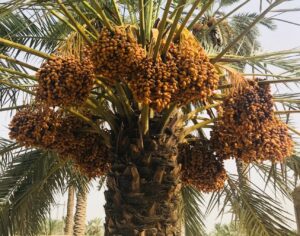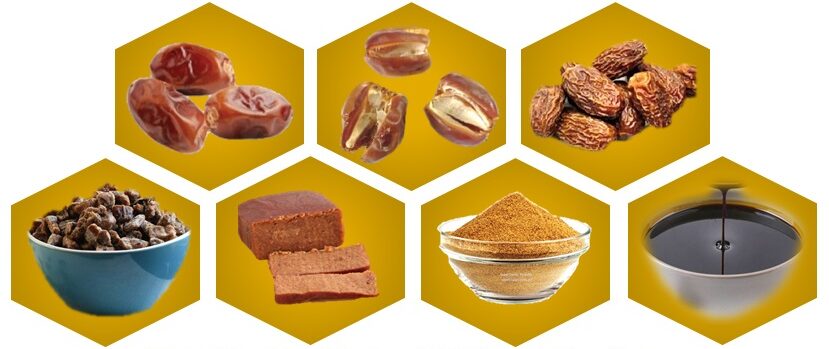
Get to know all about dates: We have gathered the most relevant and useful information about the dates from Pakistan.
Aseel Dates Price Range for Export
| Product (Latest Crop) | Price Range USD $ / M Ton |
|---|---|
| Aseel Pitted Dates Select Grade | 1950-2500 |
| Aseel Pitted Dates GAQ Grade | 1150-2200 |
| Aseel Pitted Dates FAQ Grade | 750-1200 |
| Aseel Pitted Dates Industrial Grade | 550-900 |
| Organic Pitted Dates | 1500-2200 |
| Diced Dates | 950-1400 |
| Aseel Dry Dates – Chuara | 1500-2500 |
| Date Paste | 850-1200 |
FAQs about Dates
Here are the answers to frequently asked common questions (FAQs) about date fruit:
- What is date palm fruit?
- What are the Types of Dates?
- What are Pitted Dates?
- What are Unpitted Dates?
- What are Aseel Dates?
- What are Medjool Dates?
- What are Regular Dates?
- What is the difference between Medjool dates versus regular dates?
- What are Diced Dates?
- What are Chopped Dates?
- What are Dry Dates?
- What are Organic Dates?
- What is Date Paste?
- What is Date Puree?
- What is Date Powder?
- What is Date Sugar?
- What is Date Honey?
- What is Date Syrup?
Date Fruit
Date Fruit: The date fruit is the fruit of the date palm tree, scientifically known as Phoenix dactylifera. It is a sweet and nutritious fruit that grows in clusters on female date palm trees. The fruit is oblong or oval-shaped and varies in size and color depending on the variety.
The date palm fruit starts as a green fruit and gradually ripens to different shades of yellow, golden, amber, brown, or even dark purple, depending on the variety and degree of ripeness. The fruit has a thin, wrinkled skin that encloses the flesh and the seed (pit) inside.
When ripe, the date palm fruit is sweet and has a chewy texture. The flavor profile can vary from honey-like sweetness to caramel, with hints of rich, fruity notes. The flesh of the fruit is soft, moist, and fibrous.
Date palm fruit is highly nutritious and contains various vitamins, minerals, and dietary fiber. They are a good source of potassium, magnesium, and vitamin B6. Dates also provide natural sugars, including glucose and fructose, which contribute to their sweet taste.
The date palm fruit is consumed fresh as a snack or used as an ingredient in various culinary preparations. They can be enjoyed on their own, added to smoothies, salads, or desserts, or used in baking to enhance the flavor and sweetness of dishes. Date palm fruits are popular in many Middle Eastern, North African, and Mediterranean cuisines and have been cultivated for thousands of years in these regions.
Types of Dates
Types of Dates: Dates are a type of fruit that grows on date palm trees and come in various varieties. Some common types of dates include Medjool dates, Deglet Noor dates, Aseel dates, Barhi dates, Zahidi dates, and Halawi dates. Each variety has its unique taste, texture, and color.
Aseel Dates
Aseel Dates: Aseel dates, also known as Pakistani dates, are a specific variety of dates that originate from Pakistan. They are known for their sweet taste, soft texture, and dark brown color.
Medjool Dates
Medjool Dates: Medjool dates are a specific variety of dates known for their large size, soft and chewy texture, and rich, caramel-like flavor. They are often referred to as the “king of dates” due to their premium quality and taste. Medjool dates have a deep brown color and wrinkled skin that may have a slight shine. They are native to Morocco but are also grown in other regions with suitable climates.
Regular Dates
Regular Dates: Regular dates, also known as common dates or standard dates, refer to dates that are not of a specific premium variety like Medjool dates. They encompass a range of date varieties that are smaller in size and may have a slightly different flavor and texture compared to Medjool dates.
Aseel Dates Vs Medjool Dates Vs Regular Dates
When comparing Medjool dates and regular dates, here are some key differences:
Size: Medjool dates are significantly larger than regular dates. Medjool dates are known for their plumpness and can be up to two to three times larger than regular dates.
Texture: Medjool dates have a soft and chewy texture. In contrast, regular dates tend to be slightly drier and firmer, although they are still sweet and enjoyable.
Flavor: Medjool dates have a rich, caramel-like flavor that is often described as indulgent and sweet. Regular dates, while still sweet, may have a slightly milder or less pronounced flavor.
Availability: Medjool dates are generally considered a premium variety and may be more readily available in specialty stores or gourmet markets. Regular dates, on the other hand, are more commonly found in regular supermarkets and grocery stores.
Usage: Both Medjool dates and regular dates can be used in similar ways, such as snacking, baking, or adding to various recipes. However, the larger size and richer flavor of Medjool dates make them particularly well-suited for stuffing, use as a centerpiece in desserts, or enjoying as a standalone treat.
It’s worth noting that regular dates can vary in quality and taste depending on the specific variety and origin. While Medjool dates are highly regarded for their exceptional taste and texture, regular dates can still be a delicious and versatile option for incorporating the natural sweetness of dates into your culinary creations.
Date Products: Pitted, Unpitted, Diced, Chopped, Dry Dates
Pitted Dates: Pitted dates refer to dates that have had their pits or seeds removed. This makes them more convenient and ready to eat, as you don’t have to worry about removing the pits yourself.
Unpitted Dates: Unpitted dates are dates that still have their pits or seeds intact. These dates require you to remove the pits before consuming or using them in recipes.
Diced Dates: Diced dates are dates that have been chopped into small, cube-shaped pieces. They are often used in baking, as a topping for desserts, or as an ingredient in salads and granola bars.
Chopped Dates: Chopped dates are dates that have been cut into smaller pieces, typically irregular in shape. They are commonly used in baking recipes, such as cookies, bread, and cakes, as well as in trail mixes and energy bars.
Dry Dates: Dry dates are dates that have been dehydrated to remove most of their moisture content. They are chewy and have a slightly wrinkled texture. Dry dates have a longer shelf life and are often used as a snack or added to various dishes for added sweetness.
Organic Dates: Organic dates are dates that have been grown without the use of synthetic fertilizers, pesticides, or genetically modified organisms (GMOs). They are cultivated using organic farming practices, which prioritize environmental sustainability and natural methods of pest and weed control.
Special Date Products: Paste, Puree, Powder & Syrup
Date Paste: Date paste is a sweet and sticky paste made by blending or processing dates into a smooth consistency. It can be used as a natural sweetener and flavoring agent in a variety of recipes, such as smoothies, desserts, energy bars, and dressings.
Date Puree: Date puree is similar to date paste but typically has a thinner consistency. It is made by blending or processing dates with some liquid, such as water or fruit juice, until smooth. Besides, date puree is commonly used as a substitute for sugar or as a natural sweetener in recipes.
Date Powder: Date powder is made by dehydrating and grinding dates into a fine powder. It can be used as a natural sweetener and flavor enhancer in baking, smoothies, shakes, and desserts. Moreover, Date powder is often used as a healthier alternative to refined sugar.
Date Sugar: Date sugar is a natural sweetener made by dehydrating and grinding dates into a granulated form. It retains the natural fiber and nutrients of dates. However, the date sugar can be used as a substitute for regular sugar in cooking and baking.
Date Honey: Date honey, also known as date syrup or date molasses, is a thick and sweet syrup made from dates. It is produced by extracting the juice from dates and then reducing it to a syrupy consistency. Moreover, date honey is commonly used as a natural sweetener and flavoring agent in desserts, marinades, and sauces.
Date Syrup: Date syrup, also known as date honey or date molasses, is a sweet syrup made from dates. It is created by cooking down dates with water and then straining the mixture to obtain a smooth syrup. in fact, date syrup is used as a natural sweetener in various recipes, including baked goods, pancakes, and beverages.
